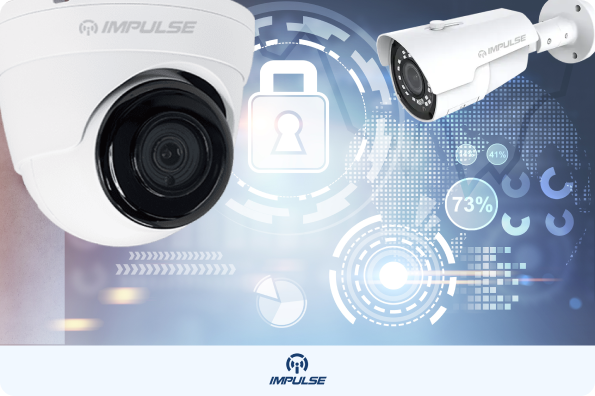As technology advances at a rapid pace, the security industry has not been left behind. The future of security with video surveillance is being shaped by the rise of sophisticated Video Management System (VMS) technology. This revolution is set to redefine how businesses, organizations, and homes manage their security, offering smarter, more efficient, and flexible solutions for surveillance needs.
In this blog, we explore the groundbreaking impact of VMS systems on modern security, how video surveillance cloud-based systems are changing the game, and why businesses must adopt these innovations to stay ahead.
The Rise of Video Surveillance Technology
Video surveillance technology has come a long way since its inception. Early systems relied on analog cameras and basic recording equipment, which were cumbersome and limited in functionality. Today, the advent of digital and cloud-based VMS solutions has transformed the landscape entirely, offering advanced video surveillance solutions that enhance security management capabilities.
VMS technology provides a centralized platform to manage multiple video surveillance systems, integrate security devices, and process vast amounts of footage in real time. This not only simplifies security operations but also ensures faster response times in critical situations.
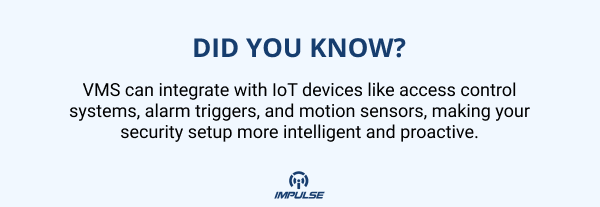
What is VMS Technology?
At its core, a Video Management System (VMS) is software that allows users to manage, record, and analyze video surveillance footage from multiple cameras in one platform. It provides enhanced functionalities such as real-time monitoring, video analytics, and customizable alerts. VMS technology is highly adaptable and can be used for commercial video surveillance systems, residential security, and industrial applications.
Cloud-Based VMS Solutions
The future of VMS lies in the cloud. Video surveillance cloud-based systems are growing in popularity due to their scalability, flexibility, and affordability. With cloud-based VMS, users can access their surveillance footage from anywhere with an internet connection, offering greater control and oversight, especially for businesses with multiple locations. These solutions eliminate the need for on-site storage, reduce maintenance costs, and provide secure data backup options.

Benefits of Cloud-Based VMS:
- Scalability: Effortlessly expand or contract your surveillance network by adding or removing cameras and devices as your business requirements evolve. This flexibility allows for seamless adaptation to changing security needs without the need for significant infrastructure overhauls.
- Cost Efficiency: Eliminate the need for expensive on-site hardware installations and ongoing maintenance costs. Cloud-based solutions offer a more budget-friendly approach to video surveillance, allowing businesses to allocate resources more effectively while still maintaining robust security measures.
- Remote Access: Gain the ability to monitor your security systems in real-time from any internet-connected device, whether it’s a smartphone, tablet, or computer. This feature provides unparalleled convenience and ensures that you can stay informed about your property’s security status, regardless of your physical location.
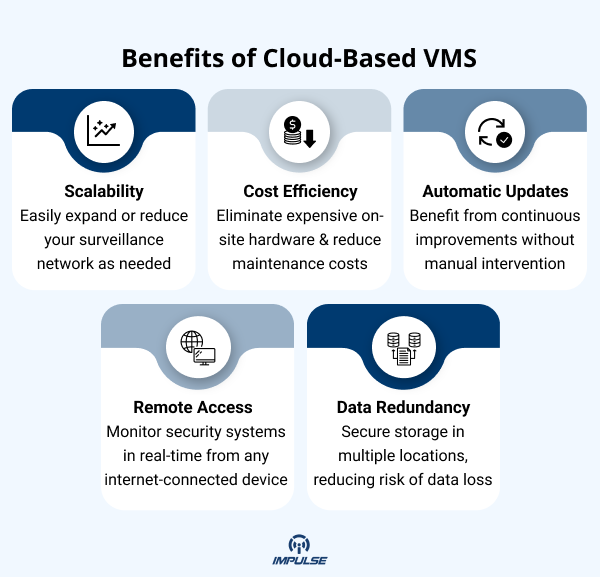
- Automatic Updates: Benefit from continuous improvements and new features without manual intervention. Cloud-based VMS providers regularly update their software, ensuring that your system always has the latest security patches and functionality enhancements.
- Data Redundancy: Enjoy peace of mind knowing that your surveillance footage is securely stored in multiple locations. Cloud-based systems typically offer redundant storage options, significantly reducing the risk of data loss due to hardware failures or localized disasters.
Also Read: Protecting Your Assets: Industrial Security Camera Solutions
Key Features of Advanced VMS Systems
A modern VMS platform offers a variety of features that enhance video surveillance and improve overall security. Here are some of the critical capabilities:
1. Real-Time Monitoring and Alerts
VMS systems offer real-time monitoring, enabling security personnel to keep an eye on events as they happen. In addition, they can set up custom alerts based on specific triggers, such as unauthorized access or motion detection during off-hours. This feature ensures that security breaches are detected instantly.
2. Advanced Video Analytics
VMS systems are powered by AI and machine learning, offering advanced analytics such as facial recognition, object detection, license plate recognition, and crowd management. These analytics provide actionable insights, allowing businesses to respond swiftly and effectively to security threats.
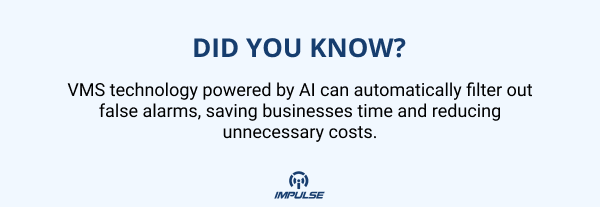
3. Scalability and Flexibility
Whether managing a small shop or a large corporate campus, VMS technology is designed to scale. Businesses can start small and expand their surveillance network as needed, adding cameras, sensors, and other security devices without overhauling their entire system.
4. Integration with Other Security Systems
VMS systems integrate seamlessly with other security solutions such as access control, fire alarms, and intrusion detection systems. This provides a unified security approach, improving efficiency and simplifying management.
Commercial Applications of VMS Systems
VMS technology is versatile and can be applied to a wide range of industries. From retail and healthcare to transportation and education, businesses can benefit from the power of video surveillance technology.
1. Retail Security
VMS technology is widely used in retail environments to prevent theft, monitor customer behavior, and ensure staff safety. With real-time video analytics, retailers can reduce shrinkage, optimize store layouts, and improve customer service.
2. Healthcare
Hospitals and healthcare facilities use VMS systems to safeguard patients and staff. Video surveillance security cameras monitor entry points, track movements within the facility, and prevent unauthorized access to restricted areas. The best security camera in India, coupled with advanced VMS, ensures that healthcare facilities maintain a high level of safety.
3. Transportation
Airports, train stations, and other transportation hubs are heavily reliant on VMS technology to monitor large crowds, detect suspicious behavior, and prevent security breaches. Cloud-based VMS systems allow transportation agencies to manage vast amounts of data while ensuring passenger safety.
Why Businesses Should Adopt Cloud-Based VMS Solutions?
With the increasing sophistication of security threats, it has become essential for businesses to adopt modern VMS systems that offer comprehensive security solutions. Traditional video surveillance systems can no longer keep up with the demands of today’s fast-paced and interconnected world. Cloud-based VMS solutions are the future of video surveillance, offering numerous advantages over traditional systems.

Cost-Effective and Scalable
Cloud-based VMS eliminates the need for expensive on-site servers, offering a cost-effective alternative for businesses of all sizes. With the ability to scale, businesses can easily expand their video surveillance network as they grow.
Enhanced Data Security
Cloud-based VMS ensures that surveillance footage is stored securely in the cloud, protected by encryption and redundancy. This prevents data loss in case of hardware failure or cyberattacks, ensuring that critical footage is always accessible when needed.
Remote Access and Control
Perhaps the most significant advantage of cloud-based VMS solutions is the ability to monitor security footage remotely. Whether you’re managing a single location or multiple branches, cloud-based systems provide real-time access from any device, giving business owners peace of mind wherever they are.
Also Read: Factory Surveillance Systems: A Guide to CCTV Cameras and More
The Future of Security with Video Surveillance
The future of video surveillance is driven by the rise of AI-powered analytics, cloud-based solutions, and integrated security systems. The next generation of video surveillance systems will be smarter, faster, and more efficient. With the ongoing development of machine learning and AI, VMS systems will be able to predict and prevent security breaches before they happen.
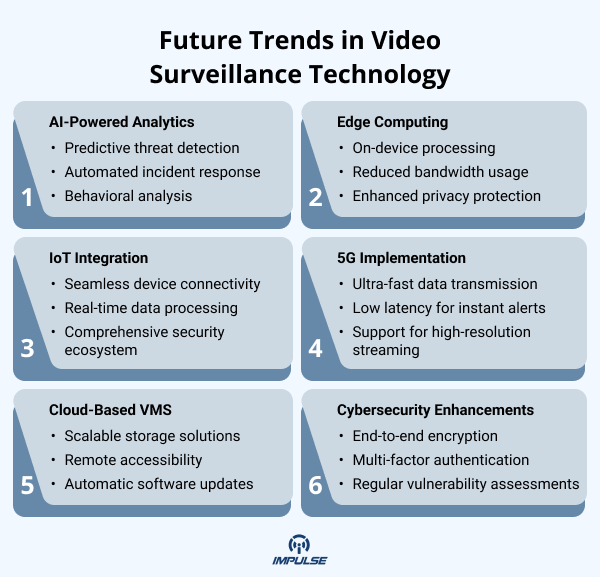
1. AI-Powered Analytics
AI-driven analytics will transform how surveillance footage is analyzed, offering predictive insights and enhanced decision-making. In the future, VMS systems will be able to detect potential threats based on historical data and automatically trigger alarms.
2. IoT and Smart Security
The integration of IoT devices into VMS systems will further enhance security capabilities. Smart sensors, connected cameras, and real-time data processing will provide a complete, 360-degree view of security operations, allowing businesses to detect and respond to threats faster.
3. 5G and Video Surveillance
The rollout of 5G networks will enhance the capabilities of video surveillance systems, offering faster data transmission and lower latency. With 5G, VMS systems will be able to process vast amounts of video data in real time, providing instantaneous responses to security events.
Choosing the Best CCTV Camera Solutions in India
When selecting the best security camera in India for your business, it’s crucial to consider the power of VMS technology. Impulse CCTV offers a wide range of advanced video surveillance solutions that integrate seamlessly with VMS systems. From commercial video surveillance systems to cloud-based VMS, Impulse CCTV provides cutting-edge security solutions tailored to your needs.
Impulse CCTV is recognized as a top CCTV camera brand in India, offering reliable, high-performance products designed to enhance your security infrastructure. Whether you’re looking for video surveillance systems for a small business or a large industrial complex, Impulse CCTV has the expertise and technology to deliver the best results.
Discover the power of VMS technology with Impulse CCTV. Our cutting-edge solutions offer unparalleled protection for your business. Explore our range of advanced security products at Impulse CCTV and experience peace of mind like never before.


